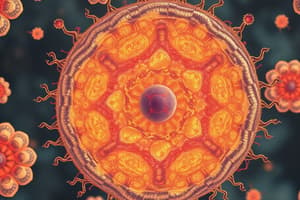Podcast
Questions and Answers
Prokaryotic Cells: Have no ______ covered nucleus
Prokaryotic Cells: Have no ______ covered nucleus
membrane
Prokaryotic Cells: Have no ______ - covered organelles
Prokaryotic Cells: Have no ______ - covered organelles
membrane
Prokaryotic Cells: Have circular ______
Prokaryotic Cells: Have circular ______
DNA
Eukaryotic ______ on a protozoan
Eukaryotic ______ on a protozoan
A person contains about 100 trillion ______
A person contains about 100 trillion ______
Which of the following is NOT a characteristic of life?
Which of the following is NOT a characteristic of life?
What is the main difference between prokaryotic and eukaryotic cells?
What is the main difference between prokaryotic and eukaryotic cells?
Which of the following statements about prokaryotic cells is true?
Which of the following statements about prokaryotic cells is true?
How many different cell types are there in mammals?
How many different cell types are there in mammals?
What is the average size of cells?
What is the average size of cells?
Flashcards are hidden until you start studying
Study Notes
Cell Types
- Prokaryotic cells have no membrane-covered nucleus.
- Prokaryotic cells have no membrane-covered organelles.
- Prokaryotic cells have circular DNA.
Eukaryotic Cells
- Eukaryotic cells are found on a protozoan.
Human Body
- A person contains about 100 trillion cells.
Characteristics of Life
- Organization is not a characteristic of life ( among others: movement, sensitivity, nutrition, reproduction, growth, and death).
Comparison of Prokaryotic and Eukaryotic Cells
- The main difference between prokaryotic and eukaryotic cells is the presence of a membrane-covered nucleus.
Prokaryotic Cells
- Prokaryotic cells are typically small and simple.
Cell Types in Mammals
- There are over 200 different cell types in mammals.
Cell Size
- The average size of cells is between 1-100 μm.
Studying That Suits You
Use AI to generate personalized quizzes and flashcards to suit your learning preferences.




